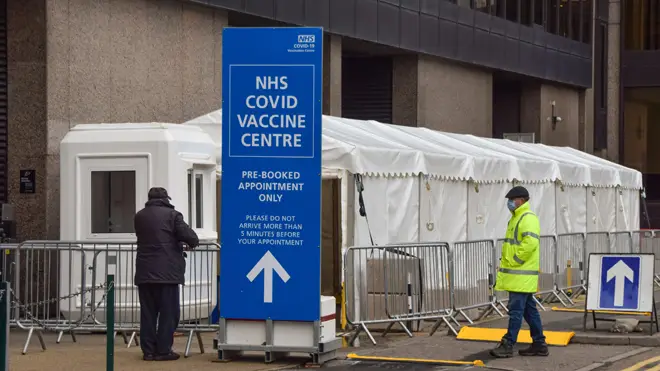
Ali Miraj 12pm - 3pm
23 January 2021, 10:22 | Updated: 23 January 2021, 10:50

Leading doctors are calling for the gap between the first and second dose of the Pfizer coronavirus vaccine to be cut in half from 12 weeks to six.
Officials in the UK have extended the interval to 12 weeks to speed up the wider rollout of the jab, but the British Medical Association (BMA) says the period should be cut to six weeks - saying there is no global precedent for this decision and the UK is "isolated" in its adoption of the strategy.
Dr Richard Vautrey, chair of the BMA GP committee in England, says there should be an urgent review. He said: "Six weeks is what the World Health Organisation recommend, they've done an analysis of the initial Pfizer data and it's what Pfizer would recommend as well."
Read more: Scientists warn of 'prolonged' lockdown due to new Covid-19 variants
Read more: Countries consider tougher restrictions on UK travellers
The BMA has written to chief medical officer for England Professor Chris Whitty calling for the gap between vaccine doses to be reduced to six weeks.
NERVTAG chair stringent measures would have prevented current Covid-19 situation
The BMA said in a statement that the call for a review "represents part of an ongoing dialogue about the best approach to the rollout of the vaccine and shares with him the growing concern from the medical profession regarding the delay of the second dose of the Pfizer-BioNTech vaccine as the UK's strategy has become increasingly isolated from many other countries."
Dr Chaand Nagpaul, BMA council chairman, said the UK should follow "best practice" and reduce the gap between doses from 12 weeks to six weeks.

New variant of Covid may be more deadly than original virus
He pointed out that giving people second doses of the Pfizer vaccine sooner would "free up" appointments for more patients in future.
Professor Chris Whitty yesterday defended the decision to delay offering a second vaccine jab, arguing it allowed for more people to be offered a level of immunity against Covid-19.
England's chief medical officer said it was still the plan to offer people two doses of the vaccine because the follow-up injection is understood to boost the length of time that someone is protected for against the virus.
But the Government adviser argued that double the number of people would receive the "great majority" of inoculation available against the deadly disease faster by following the strategy of extending the gap between doses from three weeks to 12.
He made the comments after being challenged by a concerned member of the public at a Downing Street press conference about the decision to delay the follow-up jab.
Prof Whitty said: "We are absolutely clear that everybody needs two vaccinations.
"The first gives the great majority, as far as we can see, of the initial protection, but the second vaccine increases that, and probably makes it longer lasting as well.
"So, we are very much committed to two vaccinations.
"The reason for extending the course of the vaccination is primarily to double the number of people that can get vaccinated, and so it is a public health decision.
"By a process of relatively simple maths, you can think that if a vaccine is more than 50% effective, if you double the number of people who are vaccinated over this very risky period when there is a lot of virus circulating, you are overall going to get some substantial benefit."